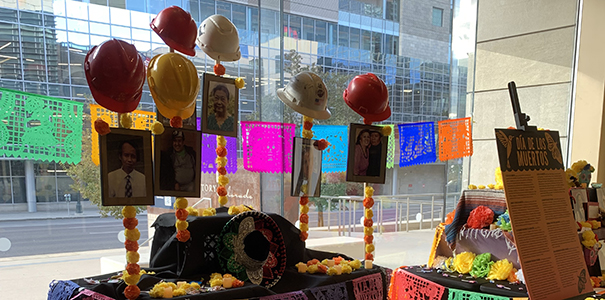“Every year I try to build an altar for my mom who passed away in 2012,” senior Sociology and Chicano Studies major Brenda Vargas said. “It’s a big tradition for me and my family in Mexico City.”
This year, students were able to add on to that celebration while at school through their Mexican American Folklore course. Associate professor and chair of Chicana/o Latinx Studies, Jonathan Alcantar partnered with History Colorado to have his students create two altars that are currently being displayed inside the museum located in Denver.
One of the altars honors the lives of the six meatpacking workers who died at JBS in Greeley during the pandemic. Students displayed their pictures below construction hats and surrounded them with marigolds. The loss hits close to home for some of the creators.
“My dad is a worker at JBS, so I was able to witness what he went through working there and since I’m from Greeley, my parents are very involved in the community. We knew three of the six individuals on the altar within our circle of acquaintances and friends, so it was very important for me to share their story and give them a platform,” said Gisselle Lopez Hernandez, a senior Political Science and Mexican American Studies major.

Above: one of two altars UNC students made remembering six JBS workers
“The goal is for the altar to bring attention to the devastating impact the pandemic had on immigrant workers,” Alcantar added.
The second altar is dedicated to Ricardo Falcón, a promising Chicano activist murdered by a white supremacist in 1979 while heading to a conference in Texas, and Los Seis de Boulder, the six Chicano student activists killed in two separate car bombings in 1974. The altar has pictures of all seven activists surrounded by candles and candy. In the middle is a sign that states “martyrs of the Chicano Movement in Colorado.”
“It’s a really prideful thing we did because at the end of the day History Colorado chose us to honor people who have been lost,” Vargas said. “That is very powerful because even though we learned about the Chicano movement, the vast majority of our peers don’t get to learn those narratives. We were able to share stories that weren’t always able to be told, and how the contributions of each activist have impacted so many generations of students.”
The altars will be on display until Nov. 13 at History Colorado in Denver. Alcantar is planning to continue this project every year to give UNC students the opportunity to showcase Mexican American culture in northern Colorado.
“Having a Mexican holiday celebrated at UNC is so amazing and I’m so glad it’s able to happen because we are a fast-growing population and love to share our traditions with others,” Lopez Hernandez said. “UNC is diverse and the fact that they care enough to celebrate their students is awesome.”
UNC’s Chicana/o and Latinx Studies program is sharing this annual tradition a little closer to home as well by hosting a display of altars created by UNC students, faculty and community members. District 6 students and their teachers were also invited to create their own altars for the Day of the Dead. The altars will be showcased on UNC’s campus through Nov. 5 in the Campus Commons.

